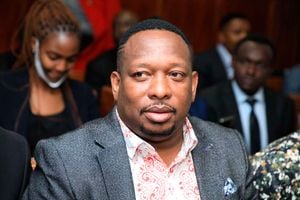
Mike Sonko’s rise in politics was meteoric. From an unknown matatu owner in Nairobi’s Eastlands to a Member of Parliament, senator and finally as Governor. His fall was equally fast – a motion was tabled before the County Assembly one afternoon in December 2020 and 88 MCAs voted to impeach him.
This was despite efforts to stop his impeachment, including flying tens of MCAs to Kwale in a bid to defeat the motion. Mr Sonko’s attempts to file a petition to stop the process were equally defeated and his short tenure as the Nairobi county government boss came to an abrupt end.
Then started a flurry of cases, mostly graft-related during his tenure at City Hall. If not related to tenders that were dished out to alleged cronies, Mr Sonko was hauled to court over terrorism charges. His bank accounts were also temporarily frozen by the Assets Recovery Agency (ARA).
Early this year, however, Mr Sonko’s fortunes started changing as cases against him started collapsing one after another. The latest happened this week when the Director of Public Prosecutions Renson Ingonga applied to terrorism charges against Mr Sonko and his two co-accused.
In a ruling, Kahawa Law Courts Principal Magistrate Daniel Kiage allowed the DPP’s application and marked the case as withdrawn. “I have considered the application by the prosecution, and I hereby mark the matter as withdrawn under section 87A of the CPC,” the court ruled. Mr Sonko was charged in 2021 together with Mr Clifford Ouko and Benjamin Odhiambo with allegedly recruiting unknown persons to participate in the commission of a terrorist act.
The charge stated that they committed the offence on or before January 1, 2021, at an unknown place in the country. The politician, who is known for rescuing distressed Kenyans, including suspects arraigned and who cannot raise bond or bail to secure their release, was also charged with possession of military attire, to be used in the commission of a terrorist act, contrary to Section 6 of the Prevention of Terrorism Act, 2012.
Sonko recently came to the rescue of Ian Njoroge – who has been charged with robbery with violence, grievous harm and resisting arrest – by standing surety for him. The teen was recently captured on camera assaulting a traffic police officer in Kasarani area.
In January, Mr Sonko and 16 others were freed of charges of misappropriation of Sh357 million, an offence he was accused of committing while serving as the Nairobi governor.
Sonko was accused of embezzling funds from the county government by awarding dubious contracts. Others who were let off the hook were the Kenya Revenue Authority (KRA) chairman Anthony Mwaura, his wife Rose Njeri, Mr Fredrick Odhiambo and Mr Anthony Otieno Ombok alias Jamal.
The DPP’s office had initially applied to terminate the case against Mr Mwaura, Ms Njeri and their companies, Hardi Enterprises Limited and Toddy Civil Engineering Company, but it was rejected by the trial magistrate.
In a ruling, the magistrate said it would be discriminatory to discharge Mr Mwaura, Ms Njeri and their firms and sustain the charges against other accused persons, yet the firms and its directors are the main suspects in the case, having been accused of illegally acquiring public funds through a tender.
Chief Magistrate Eunice Nyutu (now a judge of the High Court) later compelled the prosecution to close the case and file their submissions. She later ruled that all the accused persons had no case to answer and freed them. The DPP, however, rushed to the High Court and Justice Nixon Sifuna allowed him to appeal against the acquittal.
“In determining the objection, I have considered all the arguments from respective parties and their submissions as well as the constitution and provisions of the Criminal Procedure Code and have come to the conclusion that the DPP can appeal an acquittal,” the judge said. Last year, another case against Mr Sonko collapsed.
In the matter, Mr Sonko was accused of corruptly receiving more than Sh25 million, through proxies and the money was allegedly deposited into his personal bank accounts in different banks and at different parts of the country.
They were, however, acquitted by Chief Magistrate Douglas Ogoti in a trial that was conducted in camera because of the safety if some witnesses, some of who were initially accused persons but later turned to the prosecution side.
The DPP filed an appeal and he faulted the magistrate for relying on technicalities to acquit Mr Sonko and the other accused persons instead of delivering substantive justice. In March this year, he was a happy man after a Kiambu Court threw out a case against him after the complainants withdrew their accusations.
Mr Sonko had been charged with various counts of assault and forcible entry of property in Buru Buru Phase Four.
The case was withdrawn when it came up for directions before senior principal magistrate Peter Ooko the prosecutor notified the court that they did not object to the complainants' application to withdraw the case. The politician had been accused of forcibly and violently entering a property belonging to Landmark International Properties. The charge stated that he committed the offence on May 25, 2019, at 2pm at Buru Buru Phase Four, Nairobi, jointly with others not before court.
It was further alleged that on the same day in May 2019, then the Nairobi governor, he led a group of men and assaulted some nine men, thereby occasioning them actual bodily harm.
Just before he was removed from office, Mr Sonko’s 10 bank accounts were frozen over suspicion that the funds were siphoned from the Nairobi County. The orders were later lifted as he protested that he was not given an opportunity to defend himself.
Proceeds of corruption
Mr Sonko had further accused ARA of engaging in a ‘fishing expedition’ because there was nothing to show that the funds in the accounts were proceeds of corruption.
Several other graft cases against him are still pending in various courts at Milimani but his stars seem aligned. Mr Sonko moved to the Supreme Court after his appeal was dismissed by the appellate court in April, saying he was properly removed and there was a substantive governor in office.
A bench of three judges also said that the charges levelled against Mr Sonko were substantiated and proved to the required standard, and that the County Assembly and the Senate could not be faulted for impeaching him. “In addition to the foregoing, the County Assembly, the Senate and the trial court were satisfied that Hon Sonko grossly misconducted himself by repeatedly using abusive, embarrassing, inappropriate and unprintable language, which undermined the office of Governor,” the judges, Roselyn Nambuye, Hannah Okwengu and Dr Imaana Laibuta, said.
The former governor maintains that his impeachment was illegal and the court should determine whether it was done as required by the law. The only case that seems in the way of Mr Sonko and heading back to public office was a Supreme Court decision on December 5, 2022, upholding his impeachment as the Nairobi county boss.
A full bench of the apex court presided by Chief Justice Martha Koome stated that impeachment and removal from office of State officers are constitutional remedies to gross violations of the constitution, the law, abuse of office and gross misconduct. The judges added that the consequences of impeachment are grave and may include disqualifications from engaging in any elective public position or to hold a public office.
“In the end, and on the basis of the opinions expressed in this judgment, we come to the ultimate conclusion that the removal from office of the appellant, Mike Mbuvi Sonko, was in compliance with the Constitution and the law,” the Supreme Court said.
Unprintable language
Mr Sonko had moved to the Supreme Court after his appeal was dismissed by the appellate court and ruled that he was properly removed from office.
A bench of three judges of the Court of Appeal said that the charges levelled against Mr Sonko were substantiated and proved to the required standard, and that the county assembly and the Senate could not be faulted for impeaching him.
“In addition to the foregoing, the County Assembly, the Senate and the trial court were satisfied that Hon Sonko grossly misconducted himself by repeatedly using abusive, embarrassing, inappropriate and unprintable language, which undermined the office of Governor,” said the judges, Nambuye (retired), Okwengu and Dr Laibuta.
But last year, Mr Sonko moved to the East African Court of Justice still hoping to challenge the Supreme Court decision. In his petition before the regional court, Mr Sonko accuses the Judiciary of handling his cases, following his impeachment as the governor of Nairobi in a flawed, tainted and marred by illegalities.
He argues that the process lacked transparency, and accountability and failed to adhere to the rule of law therefore infringing Article 6(d) and 7(2) of the Treaty of the Establishment of East African Community in that he has been discriminated against and has been selectively persecuted.







